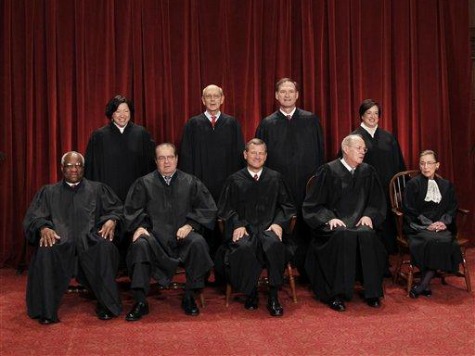
The pro-life Susan B. Anthony List (SBA) was investigated for allegedly violating an Ohio election law banning false speech in campaign messages. It has now won on an issue at the Supreme Court that allows SBA to proceed with its lawsuit, arguing Ohio’s law violates free speech.
Ohio law prohibits “false statements” about the “voting record of a… public official” in campaign ads during elections. Former Rep. Steven Driehaus (D-OH) filed a complaint with the Ohio Elections Commission against SBA in 2010. The pro-life group made an ad that said Driehaus’ vote to pass Obamacare was a vote for abortion. The ad read, “Shame on Steve Driehaus! Driehaus voted FOR taxpayer-funded abortion.” When the commission began investigating the case, SBA filed suit in federal court arguing the law is unconstitutional.
Later that year, Driehaus lost to Rep. Steve Chabot. Driehaus then withdrew his complaint with SBA’s consent, and SBA continued its lawsuit against the Ohio statute. The U.S. District Court for the Southern District of Ohio dismissed the suit, in part holding that SBA (and another plaintiff from a consolidated case) no longer faced a concrete injury to give them standing to continue the lawsuit.
In dismissing on this procedural matter, the district court never reached the First Amendment issue. The U.S. Court of Appeals for the Sixth Circuit affirmed the dismissal on the procedural question, holding that the commission’s probable-cause finding that authorized the investigation, then dropping it once withdrawn, meant SBA was not injured by the law, and that SBA had not actually received an adverse ruling.
In Susan B. Anthony List v. Driehaus, the U.S. Supreme Court reversed in a unanimous decision written by Justice Clarence Thomas. Discussing the issue of standing by citing Court precedents, Thomas writes:
Article III of the Constitution limits the jurisdiction of the federal courts to cases and controversies. The doctrine of standing gives meaning to these constitutional limits by identifying those disputes which are appropriately resolved through the judicial process. The law of Article III standing, which is built on separation-of-powers principles, serves to prevent the judicial process from being used to usurp the powers of the political branches. To establish Article III standing, a plaintiff must show (1) an injury in fact, (2) a sufficient causal connection between the injury and the conduct complained of, and (3) the likelihood that the injury will be redressed by a favorable decision.
In terms of how those constitutional limits work when a person has not actually had the law used against them yet, Thomas continued:
One recurring issue in our cases is determining when the threatened enforcement of a law creates an Article III injury. When an individual is subject to such a threat, an actual arrest, prosecution, or other enforcement action is not a prerequisite to challenging the law. It is not necessary that petitioner first expose himself to actual arrest or prosecution to be entitled to challenge a statute that he claims deters the exercise of his constitutional rights.
Applying those principles to SBA’s situation, Thomas reasoned that SBA has standing. “First, petitioners have alleged an intention to engage in a course of conduct arguably affected with a constitutional interest,” since SBA makes it clear they plan to make ads like this in upcoming elections. “Because petitioners’ intended future conduct concerns political speech, it is certainly affected with a constitutional interest.”
Thomas also found, secondly, that SBA’s “intended future conduct is arguably proscribed by the statute they wish to challenge.” Although the lower court dismissed the case because it took SBA at its word that its campaign messages would be truthful, the Supreme Court held that this doesn’t deprive SBA of standing, since SBA stands by the accuracy of its Driehaus ad, and yet that didn’t stop the commission from launching an investigation against the pro-life group.
So without dissent, a 9-to-0 Court sent the case back to the lower court for consideration of another procedural matter, and if that is satisfied, for the lower court to also rule on the constitutionality of Ohio’s law.
Ken Klukowski is senior legal analyst for Breitbart News. Follow him on Twitter @kenklukowski.

COMMENTS
Please let us know if you're having issues with commenting.